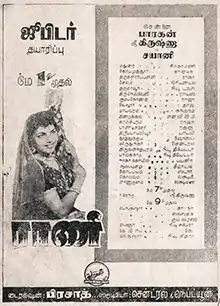Rani (1952 film)
Rani (transl. Queen) is a 1952 Tamil-language film directed by L. V. Prasad. The film stars P. Bhanumathi, S. Balachander, Wahab Kashmiri, S. V. Subbaiah, M. K. Mustafa, M. Saroja, G. M. Basheer, M. S. S. Bhagyam, Lakshmiprabha, C. S. D. Singh, M. R. Santhanam, K. S. Angamuthu and Baby Sachu.
| Rani | |
|---|---|
 Theatrical release poster | |
| Tamil | ராணி |
| Directed by | L. V. Prasad |
| Produced by | M. Somasundaram |
| Starring | P. Bhanumathi S. Balachander |
| Music by | C. R. Subburaman D. C. Dutt |
| Cinematography | W. R. Subba Rao |
| Edited by | M. A. Thirumugam |
Production company | |
| Distributed by | Jupiter Pictures |
Release date |
|
| Country | India |
| Language | Tamil |
Plot
A little princess, Ranjani (Baby Saraswathi) is tattooed with the royal insignia as part of tradition, and the same night, the child is kidnapped by one of the members of the tattoo gang (Wahab Kashmiri) who brings her up as a gypsy girl renaming her Rani. Unaware of her royal lineage, she grows up hawking things on the street and getting into brawls with no punches pulled. She falls in love with a soldier and the story progresses with twists. After several hardships, she realises the truth, and all is well that ends well.
Cast
- P. Bhanumathi
- S. Balachander
- S. V. Subbaiah
- M. Saroja
- Wahab Kashmiri
- M. K. Mustafa
- G. M. Basheer
- M. S. S. Bhagyam
- Lakshmiprabha
- C. S. D. Singh
- M. R. Santhanam
- K. S. Angamuthu
- Baby Sachu
Production
The film was shot partly at Central Studios, Coimbatore, which Jupiter Pictures had taken on lease, and also at Neptune Studios, Madras. Jupiters took it on lease after relocating from Coimbatore to Madras. The iconic Malayalam filmmaker K. S. Sethumadhavan worked as an assistant director, and M. A. Thirumugam, later a successful Tamil filmmaker, was the editor. The art direction was by the inimitable A. K. Sekhar, while W. R. Subba Rao, trick photograph wizard, handled the camera. Wahab Kashmiri, hailing from Kashmir, moved to Calcutta where he worked as assistant director, and also acted in movies. He relocated to South India, where he worked in Coimbatore, and directed movies for Modern Theaters (Chitra) and others. However, in the making of the film, things were not going smoothly and ego clashes developed among artists, filmmakers and others. To add to the problem, the film was simultaneously produced in Hindi starring Anoop Kumar (Ashok Kumar's brother), who was no match for Bhanumathi. For many reasons, Sami was replaced with L. V. Prasad, who took his bow in Tamil cinema, and he directed both the Tamil and the Hindi versions.[2]
Soundtrack
Music was composed by C. R. Subburaman assisted by D. C. Dutt who conducted the orchestra. Lyrics were penned by Ku. Sa. Krishnamoorthy, K. D. Santhanam, Udumalai Narayana Kavi and T. K. Sundara Vathiyar. Singers are S. Balachander and P. Bhanumathi. Playback singers are C. R. Subburaman, D. C. Dutt, Thiruchi Loganathan, T. A. Mothi, Jikki and P. Susheela.[3]
| No. | Song | Singer/s | Lyricist | Duration (m:ss) |
|---|---|---|---|---|
| 1 | "Maamalar Thoovida | C. R. Subburaman, Jikki & group | Ku. Sa. Krishnamoorthy | |
| 2 | "Poraadum Vanmai | C. R. Subburaman, S. Balachander, Jikki & group | ||
| 3 | "Neela Kangalai" | D. C. Dutt, Jikki & group | K. D. Santhanam | |
| 4 | "Ulle Onnu Veliye Onnu" | C. R. Subburaman, Thiruchi Loganathan, P. Susheela & group | ||
| 5 | "Needhiyillaa Ulagile" | D. C. Dutt & T. A. Mothi | ||
| 6 | "Ini Endrum Inbam Thaan" | D. C. Dutt, Jikki & group | ||
| 7 | "Thalo Thale Thalo" | Jikki | 03:04 | |
| 8 | "Naane Gnaaniyar" | P. Bhanumathi | ||
| 9 | "Madhi Mayangum Malar Vanam" | |||
| 10 | "Karugi Pugaiyum Pugaiye" | T. K. Sundara Vathiyar | ||
| 11 | "Unmaiyillaadha Ulagile" | |||
| 12 | "Samayam Vaachchadhu" | |||
| 13 | "Cheeppu Chunukkani Chimini" | Udumalai Narayana Kavi | ||
| 14 | "Samarasam Nilaiperum" | C. R. Subburaman, P. Bhanumathi & group |
Critical reception
An article published in The Hindu reviewed: "Bhanumathi excelled in the title role. Balachandar, slim and handsome, was somewhat miscast, and the romantic sequences between them raised laughs! Despite the impressive cast and pleasing music, Rani flopped in both languages. Remembered for Bhanumathi's excellent performance, melodious music and well-choreographed dances.[2]
References
- Film News Anandan (23 October 2004). Sadhanaigal Padaitha Thamizh Thiraipada Varalaru [History of Landmark Tamil Films] (in Tamil). Chennai: Sivakami Publishers. Archived from the original on 8 February 2018.
- Randor Guy (20 May 2010). "Rani (1952)". The Hindu. Archived from the original on 8 February 2018.
- G. Neelamegam. Thiraikalanjiyam — Part 1 (in Tamil). Manivasagar Publishers, Chennai 108 (Ph:044 25361039). First edition December 2014. p. 43.